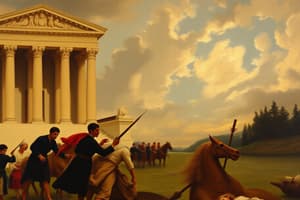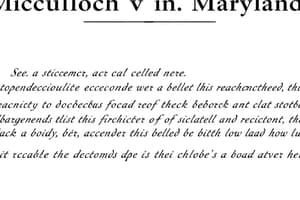Podcast
Questions and Answers
According to the ruling in McCulloch v. Maryland, the Supreme Court concluded that Congress had implied powers under which clause of the Constitution?
According to the ruling in McCulloch v. Maryland, the Supreme Court concluded that Congress had implied powers under which clause of the Constitution?
- The Commerce Clause of Article I, Section 8
- The Equal Protection Clause of the Fourteenth Amendment
- The Supremacy Clause of Article VI
- The Necessary and Proper Clause of Article I, Section 8 (correct)
In McCulloch v. Maryland, the Supreme Court ruled that the state of Maryland lacked the power to do what to the Bank?
In McCulloch v. Maryland, the Supreme Court ruled that the state of Maryland lacked the power to do what to the Bank?
- Charter it
- Seize it
- Regulate it
- Tax it (correct)
What did Chief Justice John Marshall's opinion in McCulloch v. Maryland do regarding Congress' discretionary power?
What did Chief Justice John Marshall's opinion in McCulloch v. Maryland do regarding Congress' discretionary power?
- Transferred it to the states
- Eliminated it entirely
- Limited it to enumerated powers only
- Gave it broad discretionary power (correct)
What type of arguments presented by counsel for Maryland did Chief Justice John Marshall repudiate in McCulloch v. Maryland?
What type of arguments presented by counsel for Maryland did Chief Justice John Marshall repudiate in McCulloch v. Maryland?
Flashcards are hidden until you start studying
Study Notes
McCulloch v. Maryland
- The Supreme Court concluded that Congress had implied powers under the Necessary and Proper Clause of the Constitution.
- The Supreme Court ruled that the state of Maryland lacked the power to tax the Bank of the United States.
- Chief Justice John Marshall's opinion in McCulloch v. Maryland expanded Congress' discretionary power, allowing it to take actions not explicitly stated in the Constitution.
- Chief Justice John Marshall repudiated narrow constructionist arguments presented by counsel for Maryland, which held that Congress only had powers explicitly stated in the Constitution.
Studying That Suits You
Use AI to generate personalized quizzes and flashcards to suit your learning preferences.




